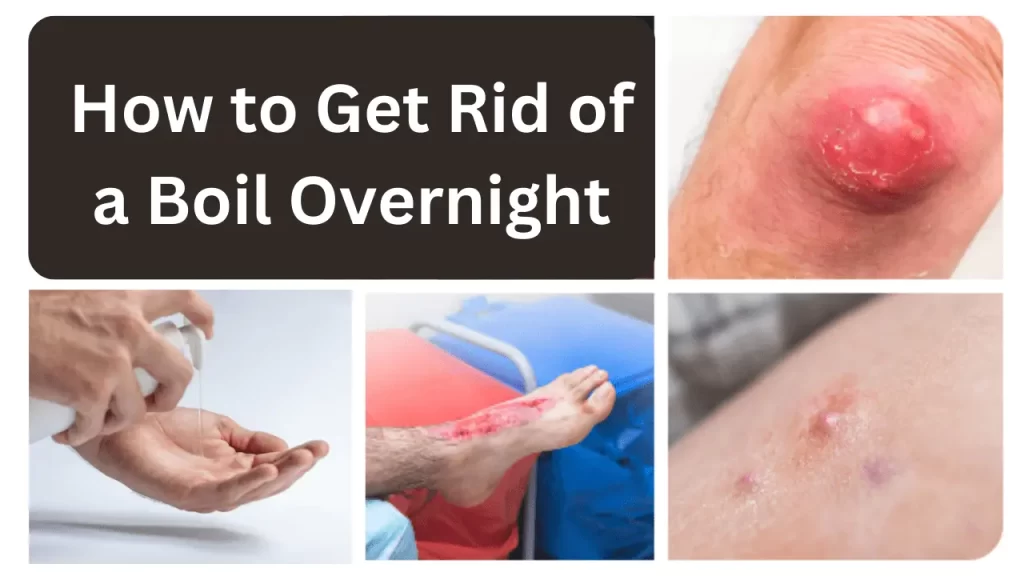
A. What is a boil?
A boil, also known as a furuncle, is a painful and inflamed lump that forms on the skin. It typically occurs when a hair follicle or oil gland becomes infected with bacteria, most commonly Staphylococcus aureus. Boils usually start as red, tender bumps and gradually develop into swollen, pus-filled nodules.
B. Causes and symptoms of boils
Boils are commonly caused by the presence of bacteria on the skin’s surface, which enters the body through cuts, nicks, or hair follicles. Some factors that can contribute to boil formation include poor hygiene, weakened immune system, friction or irritation, and underlying health conditions such as diabetes.
The symptoms of a boil may include:
- Red, swollen, and painful lump on the skin
- Formation of a white or yellow pus-filled head
- Tenderness and warmth around the affected area
- Gradual increase in the size of the lump
- Generalized discomfort or fever in severe cases
C. Importance of treating boils promptly
Treating boils promptly is crucial for several reasons. Firstly, boils can be extremely painful and cause discomfort, making it essential to alleviate symptoms as soon as possible. Moreover, untreated boils have the potential to spread the infection to other areas of the body or to other people through direct contact. If the infection spreads, it can lead to more severe complications such as cellulitis or abscess formation. Therefore, early intervention and proper treatment can prevent further complications and promote faster healing.
1. Home Remedies for Boils
A. Understanding the limitations of overnight treatment
It’s important to note that while some home remedies can provide relief and promote healing, completely getting rid of a boil overnight may not always be possible. Boils typically require time to develop, come to a head, and naturally drain. Home remedies can help expedite the healing process and alleviate symptoms, but their effectiveness may vary depending on the severity of the boil. It’s essential to have realistic expectations and be aware that professional medical attention may be necessary in some cases.
B. Preliminary steps before attempting overnight remedies
Before attempting any overnight remedies for boils, it’s crucial to follow these preliminary steps:
- Maintain good hygiene: Cleanse the affected area gently with mild soap and warm water to keep it free from dirt and bacteria.
- Apply warm compresses: Use a clean cloth soaked in warm water and apply it to a-u[8hn boil for 10-15 minutes, several times a day. This helps to reduce pain, promote circulation, and encourage the boil to come to a head.
- Avoid squeezing or popping: It’s important to resist the urge to squeeze or pop the boil, as it can lead to further infection or the spread of bacteria. Let the boil naturally drain or seek medical assistance if needed.
- Avoid tight clothing: Wear loose-fitting clothes to prevent friction and irritation around the boil.
- Boost your immune system: Ensure you’re getting adequate rest, eating a balanced diet, and staying hydrated to support your body’s natural healing processes.
By following these preliminary steps, you can create a suitable environment for treating the boil and increase the effectiveness of overnight remedies. Remember, if the boil is severe, accompanied by a high fever, or doesn’t show signs of improvement, it’s advisable to consult a healthcare professional for appropriate diagnosis and treatment
2. Immediate Relief Measures
A. Warm compress application
One of the most effective and soothing immediate relief measures for a boil is the application of a warm compress. The warmth helps to increase blood circulation to the area, promoting healing and encouraging the boil to come to a head. Here’s how to apply a warm compress:
- Take a clean washcloth and soak it in warm water.
- Gently wring out the excess water.
- Place the warm compress on the boil for 10-15 minutes.
- Repeat this process several times a day to alleviate pain and aid in the natural drainage of the boil.
B. Use of antibacterial ointments or creams
Applying antibacterial ointments or creams can help prevent further infection and promote the healing of the boil. Here are some steps to follow
- Cleanse the affected area with mild soap and warm water.
- Pat the area dry with a clean towel.
- Apply an over-the-counter antibacterial ointment or cream directly to the boil.
- Cover the boil with a sterile gauze pad or bandage to protect it from further contamination.
- Repeat this process after each warm compress application or as directed by a healthcare professional.
C. Pain relief techniques
Boils can be quite painful, and managing the discomfort is an important aspect of immediate relief. Consider the following pain relief techniques:
- Over-the-counter pain relievers: Non-steroidal anti-inflammatory drugs (NSAIDs) such as ibuprofen or acetaminophen can help alleviate pain and reduce inflammation. Follow the instructions on the packaging and consult a healthcare professional if needed.
- Elevation: Elevating the affected area, if possible, can help reduce swelling and relieve some of the pain associated with the boil.
- Avoid tight clothing: Wearing loose-fitting clothing can minimize friction and pressure on the boil, providing some relief from discomfort.
- Gentle cleansing: Cleanse the boil with mild soap and warm water, being careful not to irritate or disturb it further.
Remember, while these immediate relief measures can help alleviate pain and promote comfort, they may not lead to overnight resolution of the boil. It’s important to continue with proper hygiene, warm compress application, and seek medical attention if the boil worsens or fails to improve.
Read Also – How to Get Nicotine out of your System in 12 Hours
3. Overnight Remedies for Boils
A. Natural remedies for drawing out the pus
-
Warm salt water soak:
Prepare a solution by dissolving a teaspoon of salt in a cup of warm water.
Soak a clean cloth in the solution and apply it as a warm compress on the boil for 10-15 minutes.
The warm saltwater helps to draw out the pus and promotes the natural drainage of the boil.
Turmeric paste application:
-
Mix turmeric powder with water or ginger juice to create a thick paste.
Apply the paste directly to the boil and cover it with a clean cloth or bandage.
Turmeric possesses anti-inflammatory and antibacterial properties, which can aid in reducing inflammation and fighting infection.
-
Tea tree oil compress:
Dilute a few drops of tea tree oil in carrier oil, such as coconut oil or olive oil.
Apply the diluted tea tree oil to a clean cloth and place it on the boil as a compress.
Tea tree oil has antimicrobial properties that can help combat the infection and promote healing.
B. Herbal remedies for promoting healing
Echinacea poultice:
- Prepare a poultice by crushing fresh or dried echinacea leaves or roots.
- Apply the poultice directly to the boil and secure it with a clean cloth or bandage.
- Echinacea possesses immune-boosting and antibacterial properties, which can aid in healing and preventing further infection.
Calendula cream or ointment:
- Apply calendula cream or ointment directly to the boil, following the product instructions.
- Calendula has anti-inflammatory and antimicrobial properties, promoting healing and soothing the affected area.
Neem oil application:
- Dilute neem oil with carrier oil, such as coconut oil or olive oil.
- Apply the diluted neem oil to a boil using a cotton ball or clean cloth.
- Neem oil has antibacterial properties and can help reduce pain and inflammation.
C. Over-the-counter treatments for quick results
Topical ointments with benzoyl peroxide or salicylic acid:
- Apply an over-the-counter ointment or cream containing benzoyl peroxide or salicylic acid to the boil.
- These ingredients can help dry out the boil and promote healing.
Over-the-counter boil relief products:
- Consider using over-the-counter boil relief products specifically designed to treat boils.
- These products may contain ingredients such as ichthammol or drawing salve, which can aid in the natural drainage of the boil.
While these overnight remedies may provide relief and aid in the healing process, it’s important to note that individual results may vary. If the boil persists, worsens, or is accompanied by severe symptoms, it’s advisable to seek medical attention for appropriate evaluation and treatment
Read Also – Sell gift cards instant payment cash app
4. Precautions and Considerations
A. Importance of proper hygiene
Maintaining proper hygiene is essential in the treatment and prevention of boils. Here are some important hygiene practices to follow:
- Wash your hands thoroughly with soap and water before touching or treating the boil.
- Cleanse the affected area gently with mild soap and warm water, being careful not to irritate or break the boil.
- Use clean towels, washcloths, and clothing to prevent the spread of bacteria.
- Avoid sharing personal items like towels, razors, or clothing with others to minimize the risk of infection transmission.
B. When to seek medical attention
While many boils can be treated at home, there are instances when medical attention is necessary. Consider seeking professional help in the following situations:
- The boil is exceptionally large, extremely painful, or rapidly worsening.
- The boil doesn’t drain or show signs of improvement after a few days of home remedies.
- You develop a fever or experience symptoms of systemic infection.
- You have recurrent boils or a history of underlying health conditions that may affect your immune system.
- The boil is on your face, near the eyes, nose, or in the groin area.
C. Preventive measures to avoid boils
Taking preventive measures can help reduce the risk of developing boils. Consider the following steps:
- Practice good hygiene, including regular handwashing and keeping the skin clean.
- Avoid squeezing or popping existing boils, as it can lead to further infection or the spread of bacteria.
- Use clean towels, bedding, and clothing, and avoid sharing personal items with others.
- Keep any cuts, wounds, or skin abrasions clean and covered until healed.
- Boost your immune system through a balanced diet, regular exercise, adequate sleep, and stress management.
Conclusion
A. Recap of overnight remedies for boils
Overnight remedies for boils can provide relief and aid in the healing process. From warm saltwater soaks to herbal remedies and over-the-counter treatments, these approaches can help draw out the pus, reduce inflammation, and promote natural drainage.
B. Final tips for managing and preventing boils
To effectively manage and prevent boils, it’s important to maintain proper hygiene, follow appropriate treatment measures, and seek medical attention when necessary. Additionally, avoiding behaviors that can introduce bacteria to the skin and taking steps to boost your immune system can help minimize the occurrence of boils.
C. Promoting overall skin health
While boils can be bothersome, taking care of your skin’s overall health is essential. This includes following a gentle skincare routine, moisturizing regularly, protecting your skin from excessive sun exposure, and avoiding harsh chemicals or irritants. By maintaining healthy skin, you can reduce the risk of various skin conditions, including boils.
Remember, the information provided here is for informational purposes only, and it’s always advisable to consult with a healthcare professional for a proper diagnosis and personalized treatment plan.

Hi I’m Rajat, I love to read and write articles. I love to write content on different topics on behalf of different companies.
